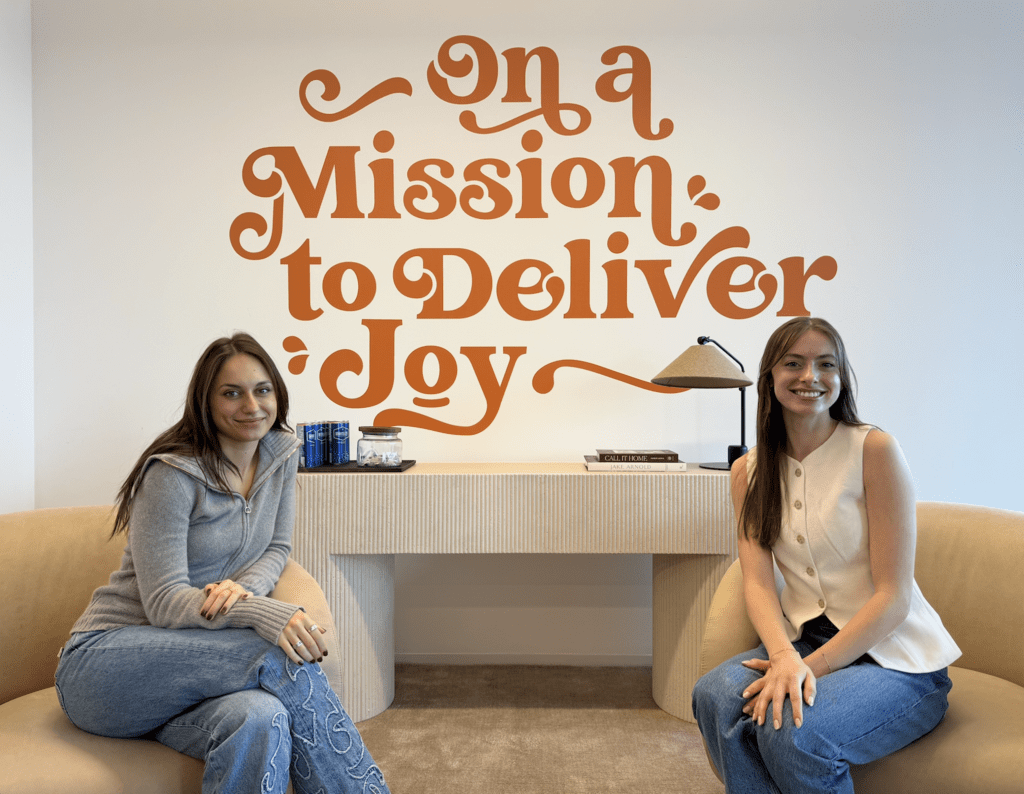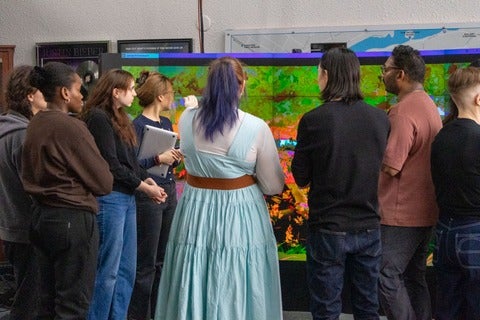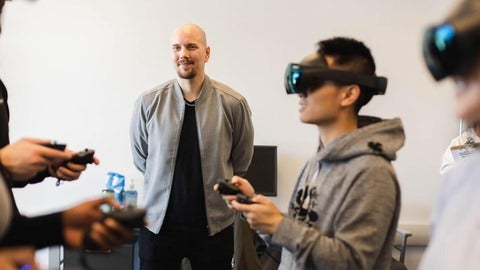News
Filter by:
Cycles of light, stories of land shine at Lights On Stratford
Three student-designed installations will be featured within Destination Stratford’s Welcome Centre.
46 students from the course “GBDA 412 – Special Topics in Digital Culture” were challenged to create large-scale interactive media art pieces for the Lights On festival, inspired by the Thirteen Grandmother Moons stories, an Indigenous knowledge tradition. Students drew inspiration from this tradition to create installations that explore light as a symbol of knowledge, community, and continuity.
Extending the boundaries of education
Dr. Ville Mäkelä and colleagues at Waterloo’s Stratford School of Interaction Design and Business are redefining education through Canada’s first large-scale VR-based 3D design course. Using tools like Gravity Sketch and immersive headsets, their innovative approach blends creativity and technology, preparing students for the future of digital design. This initiative sets new standards for interactive learning and showcases Waterloo’s leadership in VR education.
GBDA alum among 10 Waterloo Entrepreneurs to Watch
Naimah Venezia (GBDA’25), named one of Waterloo’s Top 10 Entrepreneurs to Watch during Global Entrepreneurship Week 2025, is redefining financial education with CoinWa—a gamified app that teaches teens essential money skills like budgeting, saving, and investing. Combining tech innovation with design thinking, Venezia is challenging norms in financial literacy and empowering the next generation through entrepreneurship.
A designer’s dystopian take on The Great Gatsby
100 years after The Great Gatsby, GBDA alum Kristen Fajardo releases a speculative, queer cyberpunk reimagining of the American classic. Her background in UX and the tech industry shaped both the novel’s content and the entrepreneurial strategies behind its launch.
Dr. Noorin Manji receives Arts Excellence Award for Teaching
At the 2025 Celebration of Arts, Dr. Noorin Manji was honoured with the Arts Award for Excellence in Teaching for her outstanding contributions to pedagogy and mentorship.
Designing tomorrow together: Local leaders fund pathways into Global Business and Digital Arts
Stratford community leaders and donors have come together to support the next generation of creative talent through a $10,000 contribution to the Global Business and Digital Arts (GBDA) Entrance Scholarship at the University of Waterloo. Spearheaded by former Stratford Mayor Dan Mathieson and former MPP John Wilkinson, the initiative provides $5,000 annually for two years to a deserving student facing financial barriers. The scholarship reflects Waterloo’s commitment to experiential education, creativity, and access, and highlights the power of local philanthropy to shape global futures.
GBDA Startup Skrimp.AI awarded Spring 2025 E-Launch Award
Henriëtta van Niekerk and her startup Skrimp.ai secured the E-Launch Award of $5,000 from the University of Waterloo's Enterprise Co-op program.
Dr. Daniel Harley among 2024 Outstanding Performance Awards recipients
The Stratford School is proud to share that Dr. Daniel Harley is among the 2024 Outstanding Performance Award recipients.
From GBDA to Gamified Financial Tools
Naimah Venezia (BGBDA ’25) began her entrepreneurial journey at age seven, inspired by her brother and the book “Rich Dad, Poor Dad.” She founded CoinWa, a gamified financial literacy app for teens, to make financial education fun and accessible. The Global Business and Digital Arts (GBDA) program at the University of Waterloo equipped her with essential skills in business, technology, and design. Through the E-Co-op program, Naimah developed CoinWa with support from mentors and employed fellow students. As she graduates, Naimah aims to enhance financial literacy among young people, preparing them for future financial success.







